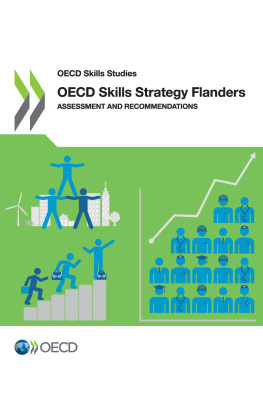OECD - OECD Skills Strategy 2019
Here you can read online OECD - OECD Skills Strategy 2019 full text of the book (entire story) in english for free. Download pdf and epub, get meaning, cover and reviews about this ebook. year: 2019, publisher: OECD Publishing, genre: Politics. Description of the work, (preface) as well as reviews are available. Best literature library LitArk.com created for fans of good reading and offers a wide selection of genres:
Romance novel
Science fiction
Adventure
Detective
Science
History
Home and family
Prose
Art
Politics
Computer
Non-fiction
Religion
Business
Children
Humor
Choose a favorite category and find really read worthwhile books. Enjoy immersion in the world of imagination, feel the emotions of the characters or learn something new for yourself, make an fascinating discovery.
OECD Skills Strategy 2019: summary, description and annotation
We offer to read an annotation, description, summary or preface (depends on what the author of the book "OECD Skills Strategy 2019" wrote himself). If you haven't found the necessary information about the book — write in the comments, we will try to find it.
OECD: author's other books
Who wrote OECD Skills Strategy 2019? Find out the surname, the name of the author of the book and a list of all author's works by series.
OECD Skills Strategy 2019 — read online for free the complete book (whole text) full work
Below is the text of the book, divided by pages. System saving the place of the last page read, allows you to conveniently read the book "OECD Skills Strategy 2019" online for free, without having to search again every time where you left off. Put a bookmark, and you can go to the page where you finished reading at any time.
Font size:
Interval:
Bookmark:

OECD (2019), OECD Skills Strategy 2019: Skills to Shape a Better Future , OECD Publishing, Paris, https://doi.org/10.1787/9789264313835-en .
Skills are vital in enabling individuals and countries to thrive in an increasingly complex, interconnected and rapidly changing world. Countries in which people develop strong skills, learn throughout their lives, and use their skills fully and effectively at work and in society are more productive and innovative, enjoy higher levels of trust, better health outcomes and a higher quality of life. Skills policies play a central role in paving countries development path by, for example, easing the adoption of new technologies and moving up the value added chain; they also make countries more attractive to foreign direct investment and tend to help foster more tolerant and cohesive societies.
Like globalisation, digitalisation and demographic change transform jobs and the way societies function and people interact. Against this background, the impetus for getting skills right is growing. To thrive in the world of tomorrow, people will need higher levels and different types of skills.
Implementing skills reforms effectively is a complex task, since skills policy is located at the intersection of education, labour market, industrial and other policy domains. This implies the need to coordinate and collaborate with a wide range of stakeholders, including ministries, officials at all levels of government, students, teachers, workers, employers, trade unions, and many others. Inter-sectoral reforms are often associated with very complex redistributive trade-offs as they are characterised by distribution and redistribution of resources across and between sectors as well as levels of government. Therefore, when designing and implementing skills policies, governments often face enormous political and technical challenges.
Since its launch in 2012, the OECD Skills Strategy has provided countries with a strategic and comprehensive approach to assessing their skills challenges and opportunities. In 2013, the OECD Skills Strategy approach went national with the development of tailored national skills strategy projects carried out in close co-operation with inter-ministerial teams in each country. Each project is designed to foster a whole-of-government approach, bringing together relevant ministries to better understand the countrys goals for the future, identify the priority areas for action, as well as to design and align skills policies to improve that particular countrys skills performance. In addition, these projects have engaged different stakeholders to improve our understanding of the current skills challenges and opportunities; solicit their perspectives on what policy responses are needed and supported; validate policy recommendations; and build support to take joint action to implement policies.
However, much has changed in the intervening years. The 2019 OECD Skills Strategy incorporates lessons learned from applying the OECD Skills Strategy framework in 11 countries, including new evidence about the implications of so-called megatrends, such as globalisation, digitalisation, population ageing or migration. It also accounts for new evidence about skills policies that work under the proper governance arrangements, including effective co-ordination and accountability mechanisms, efficient funding from different sources and information systems.
The 2019 OECD Skills Strategy draws upon learning across the Organisation, including the OECD Centre for Skills (SKC); the Directorate for Employment, Labour and Social Affairs (ELS); the Directorate for Education and Skills (EDU); the Directorate for Science, Technology and Innovation (STI); the Economics Department (ECO); the Centre for Tax Policy and Administration (CTP); the Centre for Entrepreneurship, SMEs, Regions and Cities (CFE); the Public Governance Directorate (GOV) and the Development Centre (DEV).
The update has also benefited from the strong support and fruitful exchanges with the delegates of the Education Policy Committee, the Employment, Labour and Social Affairs Committee, the Skills Strategy Advisory Group, and representatives of the Trade Union Advisory Committee and the Business and Industry Advisory Committee.
The key policy recommendations are organised around three broad components of the updated 2019 OECD Skills Strategy:
Developing relevant skills over the life course. To ensure that countries are able to adapt and thrive in a rapidly changing world, all people need access to opportunities to develop and maintain strong proficiency in a broad set of skills. This process is lifelong, starting in childhood and youth and continuing throughout adulthood. It is also life-wide, occurring not only formally in schools and higher education, but also non-formally and informally in the home, community and workplaces.
Using skills effectively in work and society. Developing a strong and broad set of skills is just the first step. To ensure that countries and people gain the full economic and social value from investments in developing skills, people also need opportunities, encouragement and incentives to use their skills fully and effectively at work and in society.
Strengthening the governance of skills systems. Success in developing and using relevant skills requires strong governance arrangements to promote co-ordination, co-operation and collaboration across the whole of government; engage stakeholders throughout the policy cycle; build integrated information systems; and align and coordinate financing arrangements.
Skills are an essential ingredient for human progress. As our societies and economies are increasingly shaped by new technologies and trends, getting skills policies right becomes even more critical for ensuring well-being and promoting growth that is inclusive and sustainable. The OECD will continue to work with countries to design, develop and deliver better skills policies for better lives in a rapidly changing world.
Font size:
Interval:
Bookmark:
Similar books «OECD Skills Strategy 2019»
Look at similar books to OECD Skills Strategy 2019. We have selected literature similar in name and meaning in the hope of providing readers with more options to find new, interesting, not yet read works.
Discussion, reviews of the book OECD Skills Strategy 2019 and just readers' own opinions. Leave your comments, write what you think about the work, its meaning or the main characters. Specify what exactly you liked and what you didn't like, and why you think so.



















